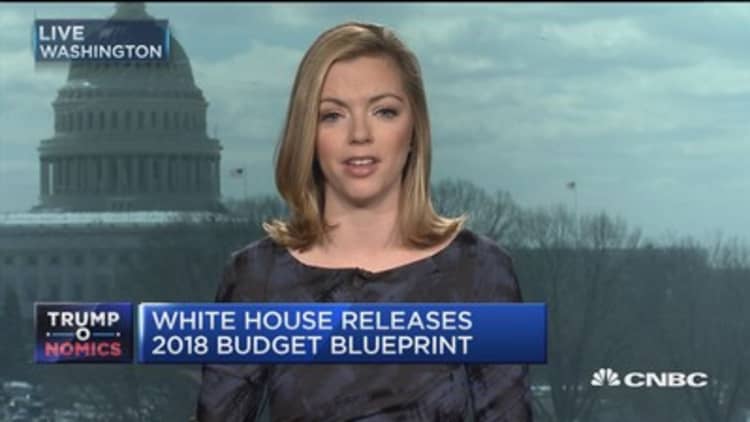
The White House budget proposed Thursday strips infrastructure funding from federal agencies to divert funds to a forthcoming executive branch infrastructure plan, according to Mick Mulvaney, director of the Office of Management and Budget.
"We believe those programs to be less effective than the package we're currently working on," Mulvaney said, calling such cuts "line-item reductions."
The administration's approach lowers or cuts entirely funding for projects deemed to have regional benefits, in order to increase funding to those with national scope. Among the priorities that fall into the latter category are investments in the nation's power grid, cybersecurity efforts and "environmentally responsible development of energy on public lands."
The biggest infrastructure programs currently sit within the Department of Transportation, which repairs highways, bridges and airports, and the Army Corps of Engineers, which maintains the country's inland waterways.
The "skinny" budget proposal released Thursday proposed a $1 billion cut to funding for the Army Corps of Engineers — amount to a 16.3 percent reduction. The White House also suggested significantly cutting Department of Transportation programs, and ending funding for so-called TIGER grants that pay for discretionary road and rail projects.
The proposed budget withdraws future capital investment grants from the Federal Transit Administration, which counts more than 60 current projects, and it significantly reduces funding to Amtrak.
Most prescriptive changes apply to the Environmental Protection Agency, whose budget the OMB proposes to cut by 31 percent.
"The Budget returns responsibility for funding local environmental efforts and programs to State and local entities, allowing EPA to focus on its highest national priorities," the document said. Accordingly, the budget seeks to ax federal money funding the Great Lakes Restoration Initiative, the Chesapeake Bay and other projects.
The budget cuts what it calls a "duplicative" Department of Agriculture grant program investing in water and wastewater in rural communities, and estimates the government will save $498 million by shifting investment to the private sector.
Many infrastructure programs on the chopping block were not assigned a price tag; of those that were, the government estimates it would save $2.3 billion from the existing budget bill.
President Donald Trump, in his joint address last month, called on Congress to procure $1 trillion through legislation for infrastructure, which appears to be the "package" Mulvaney was referencing, although it's now largely believed to originate in the White House.
Eight Democrats in the Senate put forth their own $1 trillion infrastructure plan in January. The administration's desire to cut costs as it pursues its own spending programs elsewhere has sparked criticism from some Democrats.
"Over the last few years, President Trump repeatedly promised the American people that he wanted to rebuild and replace our aging network of crumbling roads, bridges, airports, transit systems, railways, ports, and water systems," said Rep. Peter DeFazio, D-Ore., on Thursday. "The President's budget, released today, guts many of those very investments—the exact opposite of what he promised."
Infrastructure purse strings as political tool
The administration will still need to rely on the technical know-how of the agency experts, even if it centralizes infrastructure funding in the executive branch, according to Jim Nussle, CEO of the Credit Union National Association and former director of the Office of Management and Budget under George W. Bush.
But Nussle said the power of the purse at the White House could become an important political tool when dealing with Congress, especially in a post-earmark world.
"It may only be a few hundred million here or there" to fund a new bridge or dam, Nussle said. "But that's a big deal to a local congressman to demonstrate their commitment."
Capitol Hill, for its part, may suffer from some infrastructure fatigue and now believes the ball is in the Trump administration's court. In the last two years, for example, Congress passed legislation totaling $305 billion to repair highways and transit systems, and later authorized 30 new projects for the ACE.
"There's been reticence in the House since the word 'Go,'" said Doug Holtz-Eakin, president of the American Action Forum. "You have to have someone own this in the West Wing."

